The Emha Ainun Najib That I Know
Contributed by Hidayat Nur Wahid, Leader of the Indonesian People’s Consultative Assembly
I have known this figure for a long time, since I was a santri[1] student at the Pondok Modern Gontor Ponorogo, where Mas[2] Emha Ainun Najib once studied. I am quite familiar with his writings in various influential media, such as Tempo magazine and others. He has long been considered to have a far-reaching outlook, a depth of knowledge, a commitment to arriving at a deep level of correction and improvement, but it seems that there is also something else; something that is not too common, in the context of that people often term a certain mischievousness of thought. Of course I can understand that in the context of the tradition that comprises his background, as a son of Jombang with all that accompanies that, and then growing up in Pesantren Gontor with all its dynamics, and then living outside of the pesantren and the communities that he met there, he continues to present various alternatives and a variety of other activities, which naturally indicate that this person, Emha Ainun Najib, is indeed embarked upon a journey that identifies ways in which we can achieve more; achievements that bring us to the light, that steers us away from all that which makes us resistant to change. His skill with holy verses is as well-developed as his ability to take flying leaps with accepted logic.
I grew to know Mas Emha Ainun Najib more directly when we were alumni together at Pondok Pesantren Modern Gontor during the era of Gus Dur[3], another son of Jombang who became the President. We often met and debated in forums that were extremely limited. There was Mas Emha Ainun Najib, the late Cak Nur[4], Kiai Haji Hasyim Muzadi[5], Dien Syamsudin[6], Pak Kiai Syukri from Pondok Pesantren Gontor, Pak Kholil Ridwan, leader of the All-Indonesia Institute for Co-operation among Pondok Pesantren, and myself. The meetings illustrated the extent of Mas Emha Ainun Najib’s friendships, which while stemming from one pesantren, were actually very varied in their activities. As usual, Mas Emha Ainun Najib was in the midst of us all, creating the conditions for lightheartedness, but at the same time making a commitment whereby these communities worked towards a solution and did not worsen existing conditions, because we were all working within the framework of one great commitment, namely Ukhuwah Islamiyah, the brotherhood that brings peace, that brings a commitment to work towards something that will give rise to a solution; these are avlues that have long been sown in the lives of us that have studied at Pondok Modern Gontor Ponorogo.
Since that time, Mas Emha Ainun Najib has made his own place in being mindful of the inner life, also in my understanding of how an activity should be managed, how an idea should be communicated, how a commitment can be struggled for together, and then, though we may not share his understanding, accepting that differences need not disturb our togetherness to work towards the good, with fresher criticisms and commitments.
It has happened that, while not of one understanding, though still joined in the path of friendship, we maintained a dialogue via telephone from Jogja to Jakarta, during which we discussed the first round of the presidential elections (2004) and then later the second. Of course I respect the political choices of Mas Emha Ainun Najib, who is proof of where an artist does not have to make a taboo of plunging himself into the world of practical politics, and of course he also respects the political choices that I have made, and so we learn that those differences do not mean that we have to be ”enemies” or end our silaturahim[7] and friendly communications, we have remained friends until now.
And so, when I was asked to make some comments about him for this book that is to be published, I took it as a great honour, but I feel that what he has done is not a ”Silent Pilgrimage” as the title indicates, a pilgrim’s journey that gives rise to quietness or which is made quietly. As far as I know, the journey of Mas Emha Ainun Najib is a journey made in the true sense of the word ’Pilgrimage’, in journeying towards Allah, towards God in His Abode. In the House of God The Allmighty, what Mas Emha does in the the context of ”silent” is not apparent, but is rather more evident in the commotion that he makes. His journey in life is just as full of commotion. From the Pondok Pesantren Modern Gontor to Padang Bulan in Jakarta and other places, it has always been the commotion that causes us to return to the essence of ourselves as people who must think and be of good character, people who must continue to improve upon our commitments, people who do not merely enage in Thowaf[8], not just being present at Arafah[9], not merely stoning the Jumroh[10], but also to become that which is written in the traditions (of the Prophet Muhammad) of the Haj Pilgrimage, and that is Mabrur[11]. To become Mabrur is of course not to become Mablul. Mablul means to become wet through perspiring in exhaustion, in fear, or by the crush of other pilgrims or even by having been doused in the waters of Zamzam[12]. Mabrur is not about flying off in a plane[13] far from Indonesia and one’s village for who knows where, only to fly home without any positive or constructive changes resulting from one’s long flight and contemplation in the Holy Land. Mabrur is a state whereby those who have made a long journey always ensure that the positive things they have achieved do not end when they end their pilgrimage to Mecca, but are held close and developed further upon returning home, whether home is Jombang, Jogja or Jakarta; wherever they go, their enthusiasm goes with them. And I hope that it is the enthusiasm that stems from Mabrur and not the mere wetness that stems from Mablul (and certainly not the mere act of taking the journey) that will always ensure that the journey of Mas Emha Ainun Najib will go on as if it were a Pilgrimage which will end in the company of the Syuhada, the Shiddiqin, the Aulia[14], and that this state of Mabrur will lead to brightness and happiness for himself and for others in this world and in the next.
Amin Ya Rabbal Alamiin[15].
[1] Santri; student at an Islamic boarding school (pesantren or madrassah)
[2] Mas; a Javanese term to denote a brother, someone perceived by the speaker to be of equal social status with the speaker.
[3] An affectionate name for Indonesia’s fourth president, and prominent NU figure, Abdurrahman Wahid.
[4] An affectionate name for Nurcholish Madjid, who founded the influential Paramadina Institute (and later a university). The ‘father’ of Islamic pluralism in Indonesia.
[5] Current leader of NU.
[6] Current leader of Muhammdiyah.
[7] An Islamic term for meetings among (esp. Muslim) friends.
[8] An Islamic term denoting the encircling of the Kaaba at the centre of Mecca; an element of the Haj.
[9] One element of the Haj Pilgrimage is to stand for many hours on the Plain of Arafah.
[10] Another element is to stone a number of pillars, which represent the devil.
[11] An Islamic term denoting a state whereby one’s pilgrimage is accepted by Allah, a state that every pilgrim obviously hopes to attain.
[12] Waters from a spring in Mecca thought to be imbued with special powers.
[13] In the original Indonesia this is a play on words whereby mabur, a term for flying, sounds similar to Mabrur.
[14] The Martyrs.
[15] An Islamic term used in closing an address or speech.
Contributed by Hidayat Nur Wahid, Leader of the Indonesian People’s Consultative Assembly
I have known this figure for a long time, since I was a santri[1] student at the Pondok Modern Gontor Ponorogo, where Mas[2] Emha Ainun Najib once studied. I am quite familiar with his writings in various influential media, such as Tempo magazine and others. He has long been considered to have a far-reaching outlook, a depth of knowledge, a commitment to arriving at a deep level of correction and improvement, but it seems that there is also something else; something that is not too common, in the context of that people often term a certain mischievousness of thought. Of course I can understand that in the context of the tradition that comprises his background, as a son of Jombang with all that accompanies that, and then growing up in Pesantren Gontor with all its dynamics, and then living outside of the pesantren and the communities that he met there, he continues to present various alternatives and a variety of other activities, which naturally indicate that this person, Emha Ainun Najib, is indeed embarked upon a journey that identifies ways in which we can achieve more; achievements that bring us to the light, that steers us away from all that which makes us resistant to change. His skill with holy verses is as well-developed as his ability to take flying leaps with accepted logic.
I grew to know Mas Emha Ainun Najib more directly when we were alumni together at Pondok Pesantren Modern Gontor during the era of Gus Dur[3], another son of Jombang who became the President. We often met and debated in forums that were extremely limited. There was Mas Emha Ainun Najib, the late Cak Nur[4], Kiai Haji Hasyim Muzadi[5], Dien Syamsudin[6], Pak Kiai Syukri from Pondok Pesantren Gontor, Pak Kholil Ridwan, leader of the All-Indonesia Institute for Co-operation among Pondok Pesantren, and myself. The meetings illustrated the extent of Mas Emha Ainun Najib’s friendships, which while stemming from one pesantren, were actually very varied in their activities. As usual, Mas Emha Ainun Najib was in the midst of us all, creating the conditions for lightheartedness, but at the same time making a commitment whereby these communities worked towards a solution and did not worsen existing conditions, because we were all working within the framework of one great commitment, namely Ukhuwah Islamiyah, the brotherhood that brings peace, that brings a commitment to work towards something that will give rise to a solution; these are avlues that have long been sown in the lives of us that have studied at Pondok Modern Gontor Ponorogo.
Since that time, Mas Emha Ainun Najib has made his own place in being mindful of the inner life, also in my understanding of how an activity should be managed, how an idea should be communicated, how a commitment can be struggled for together, and then, though we may not share his understanding, accepting that differences need not disturb our togetherness to work towards the good, with fresher criticisms and commitments.
It has happened that, while not of one understanding, though still joined in the path of friendship, we maintained a dialogue via telephone from Jogja to Jakarta, during which we discussed the first round of the presidential elections (2004) and then later the second. Of course I respect the political choices of Mas Emha Ainun Najib, who is proof of where an artist does not have to make a taboo of plunging himself into the world of practical politics, and of course he also respects the political choices that I have made, and so we learn that those differences do not mean that we have to be ”enemies” or end our silaturahim[7] and friendly communications, we have remained friends until now.
And so, when I was asked to make some comments about him for this book that is to be published, I took it as a great honour, but I feel that what he has done is not a ”Silent Pilgrimage” as the title indicates, a pilgrim’s journey that gives rise to quietness or which is made quietly. As far as I know, the journey of Mas Emha Ainun Najib is a journey made in the true sense of the word ’Pilgrimage’, in journeying towards Allah, towards God in His Abode. In the House of God The Allmighty, what Mas Emha does in the the context of ”silent” is not apparent, but is rather more evident in the commotion that he makes. His journey in life is just as full of commotion. From the Pondok Pesantren Modern Gontor to Padang Bulan in Jakarta and other places, it has always been the commotion that causes us to return to the essence of ourselves as people who must think and be of good character, people who must continue to improve upon our commitments, people who do not merely enage in Thowaf[8], not just being present at Arafah[9], not merely stoning the Jumroh[10], but also to become that which is written in the traditions (of the Prophet Muhammad) of the Haj Pilgrimage, and that is Mabrur[11]. To become Mabrur is of course not to become Mablul. Mablul means to become wet through perspiring in exhaustion, in fear, or by the crush of other pilgrims or even by having been doused in the waters of Zamzam[12]. Mabrur is not about flying off in a plane[13] far from Indonesia and one’s village for who knows where, only to fly home without any positive or constructive changes resulting from one’s long flight and contemplation in the Holy Land. Mabrur is a state whereby those who have made a long journey always ensure that the positive things they have achieved do not end when they end their pilgrimage to Mecca, but are held close and developed further upon returning home, whether home is Jombang, Jogja or Jakarta; wherever they go, their enthusiasm goes with them. And I hope that it is the enthusiasm that stems from Mabrur and not the mere wetness that stems from Mablul (and certainly not the mere act of taking the journey) that will always ensure that the journey of Mas Emha Ainun Najib will go on as if it were a Pilgrimage which will end in the company of the Syuhada, the Shiddiqin, the Aulia[14], and that this state of Mabrur will lead to brightness and happiness for himself and for others in this world and in the next.
Amin Ya Rabbal Alamiin[15].
[1] Santri; student at an Islamic boarding school (pesantren or madrassah)
[2] Mas; a Javanese term to denote a brother, someone perceived by the speaker to be of equal social status with the speaker.
[3] An affectionate name for Indonesia’s fourth president, and prominent NU figure, Abdurrahman Wahid.
[4] An affectionate name for Nurcholish Madjid, who founded the influential Paramadina Institute (and later a university). The ‘father’ of Islamic pluralism in Indonesia.
[5] Current leader of NU.
[6] Current leader of Muhammdiyah.
[7] An Islamic term for meetings among (esp. Muslim) friends.
[8] An Islamic term denoting the encircling of the Kaaba at the centre of Mecca; an element of the Haj.
[9] One element of the Haj Pilgrimage is to stand for many hours on the Plain of Arafah.
[10] Another element is to stone a number of pillars, which represent the devil.
[11] An Islamic term denoting a state whereby one’s pilgrimage is accepted by Allah, a state that every pilgrim obviously hopes to attain.
[12] Waters from a spring in Mecca thought to be imbued with special powers.
[13] In the original Indonesia this is a play on words whereby mabur, a term for flying, sounds similar to Mabrur.
[14] The Martyrs.
[15] An Islamic term used in closing an address or speech.
Translated by Ian L. Betts

































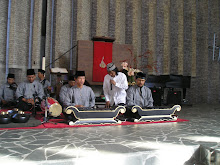
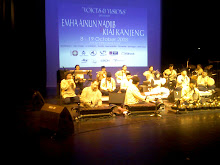

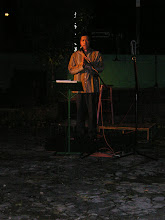



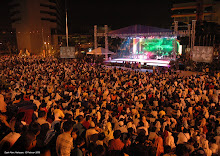
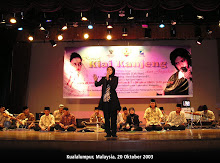
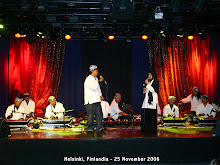.jpg)



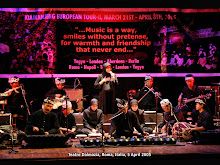


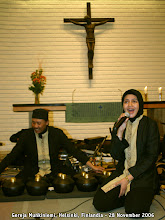.jpg)

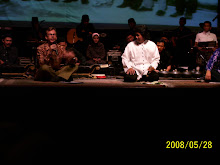.jpg)
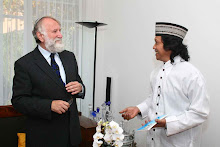
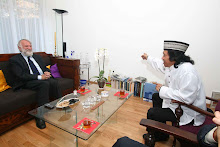
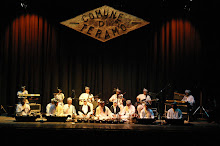


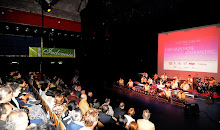

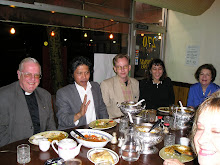


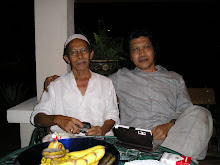
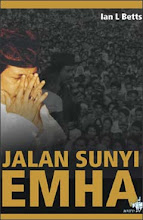
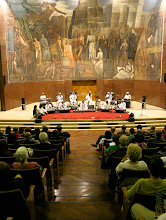
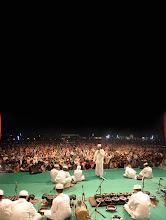

No comments:
Post a Comment